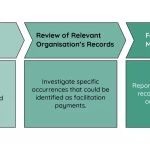As the name implies, cryptocurrency is a digital currency which uses encryption to verify transactions. Therefore, advanced coding is involved in both storing and transmitting cryptocurrency data between wallets and to public records. The aim of the encryption being used is to provide safety to users.
However, cryptocurrency is based on a decentralized system that records transactions and issues new units. This means that it does not have a regulating authority, and no banks verify the transactions.
The number of crypto users are increasing, and more are to be expected in the future. For instance, the use of crypto could expand to include buying of stocks and other assets. This is one side of the coin, as another opportunity arises: the use of cryptocurrency for bribery and facilitation payments.
Cryptocurrency in crime
There are thousands of cryptocurrencies out there: the most famous are Bitcoin, Ethereum, Litecoin and Ripple.
Bitcoin is already known to be the preferred payment method on the Deep Web for illegal services and assets – such as its close connection to the Silk Road. Additionally, it is known that ISIS employs Bitcoin for financing its terrorist operations. This is rightly because it is an anonymized and deregulated method of payment. Despite this being already known and acknowledged, there is an absence of serious discussions surrounding this topic and its relations to bribery, extortion and other related crimes.
And it is exactly because of this silence that this threat gets even stronger: since cryptocurrency is not regulated, in numerous illegal transactions could be ongoing in this very moment.
Investigators can only connect an individual to a transaction if they discover their Bitcoin address. In theory, crypto transactions are not necessarily untraceable. Even though there are some security measurements within Bitcoin wallets – such as uploading of personal information, these can be sidestepped if a user can operate the Tor browser. This way, users don’t need to reveal their identity and can hide the transaction’s origin and destination. As an extra precaution, some users can ask for private meetings for exchanges at a small fee with no questions asked – could this be called a crypto scenario of facilitation payment?
To demonstrate the perils of bribery paid by cryptocurrency, the website ACFE Insights describes the following scenario:
A construction company agrees to bribe a city official in exchange for facilitating the award of a lucrative public works contract. Given the high stakes involved, the bureaucrat wants no incriminating evidence that could potentially be uncovered in an investigation. After careful discussion, the parties arrive at a mutually agreeable solution.
In light of the construction industry’s common practice of paying certain workers in cash, a weekly purchase order request begins to be submitted at the company which describes compensation for day laborers. At the direction of executives, a trusted manager pays cash for a used laptop that he connects to a downtown coffee shop’s public Wi-Fi network during his lunch break in order to set up several Bitcoin wallets. He decides on an anonymous wallet or perhaps a Chinese wallet since they are the most unlikely to cooperate with Western authorities in the event of a subpoena. Shortly thereafter, the manager starts making weekly deposits of $5,000 into his wallet via anonymous Bitcoin ATMs . Using Bitcoin Fog on the Deep Web, the manager transfers $20,000 in cash per month to the city official who keeps the money hidden online in his wallet. Once a quarter, the bureaucrat travels abroad to cash out his small fortune using local Bitcoin traders and Bitcoin ATMs, partaking in luxury vacations and spending sprees. After the entirety of the $250,000 bribe has been paid to the city official, the construction manager physically destroys the laptop and never accesses the Bitcoin wallets again.
As demonstrated, bribery has a safe haven with Bitcoin and other cryptocurrencies, as there are few methods of detection – so much so investigators would struggle to uncover deals. A trail of evidence in this manner would so scant that it is not sufficient to base a prosecution.
What now?
Bitcoin has fallen over 70% from its record peak in November. And despite what is now called the ‘crypto winter’, Bank of England’s deputy governor John Cunliffe expressed that regulators need to bring the currency within the regulatory perimeter. According to him, even though prices are low, boundaries between digital and traditional currencies are expected to be increasingly blurred.







